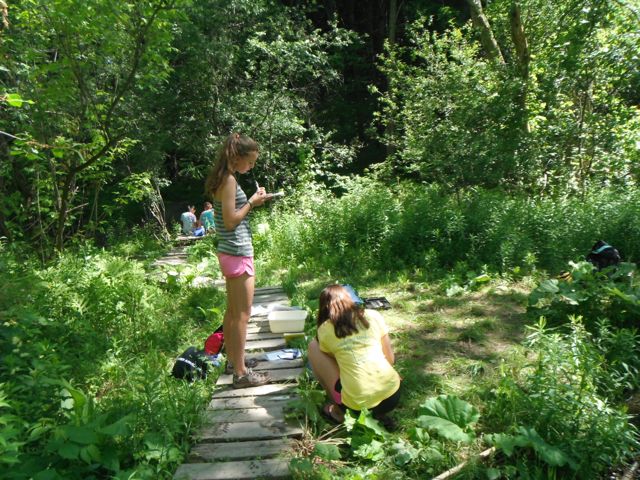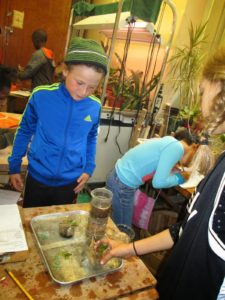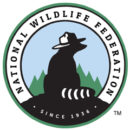We have much more to do and your continued support is needed now more than ever.
Eco-Schools USA Traveling Along the Pathways to Sustainability – Part 1

School is in full swing and as Eco-Schools USA begins its ninth year, we are excited to introduce two new environmental focus areas, or pathways. This brings the total number of pathways to 12, and provides schools with opportunities to integrate a wide-range of authentic, place-based, and environment focused instructional strategies a part of the school’s curriculum. Use our flexible seven step framework to focus on topics like climate change, biodiversity, healthy schools or sustainable foods. To kick-off the 2017-2018 school year, join us and share our 3 part series, which highlights all 12 pathways and idea springboards to get you started.
SERIES 1 – WOW (Watersheds, Oceans and Wetlands), Learning About Forests (LEAF), Climate Change and Healthy Living
WOW (Watersheds, Oceans and Wetlands)
No matter where your school is located, learning to be good stewards of our waterways is crucial. Students can address any of the three pathways: Watersheds, Oceans or Wetlands to learn how to better conserve and protect these precious natural resources.
- Invite a local resource specialist or non-profit to speak to your school about how students can help protect and monitor their watershed.
- Students can develop an awareness campaign around how the community relies on the ocean; bringing attention to problems and solutions associated with litter, especially plastics.
- Students can conduct field investigations on the impacts of runoff on wetland wildlife.
Learn more about the WOW pathway.
Learning About Forests (LEAF)

Our 2nd new pathway, Learning About Forests (LEAF) is a Foundation for Environmental Education (FEE) program hosted by National Wildlife Federation in the United States. Using outdoor and classroom learning, students have an opportunity to increase their knowledge about the key role forests play in sustaining life on our planet. One action a school can take is to help identify invasive plant species on school grounds or in a local community forest.
- Contact your local native plant society or state Department of Forestry to find out which plants are invasive in your area.
- Learn the appropriate way to remove invasive plants you are targeting, then plan school or community events to remove invasive plants.
- Replace invasive and non-native plants with native trees and shrubs
Learn more about the Learning About Forests (LEAF) pathway.
Climate Change
Schools addressing our climate change pathway are engaging in fact-based science investigations around Earth’s climate problems. They are reducing their carbon footprints, and through collaboration are designing resilience and mitigation solutions to the ongoing climate crisis. Kick off the Climate Change pathway by:
- Understanding how to age appropriately talk to students about climate change.
- Taking the Cool School Challenge, where classrooms (or individual students) can join the challenge to reduce their carbon emissions during the school year.
- The Eco-Schools USA website has plenty of age appropriate climate change education resources, like Climate Classroom and Climate Classroom Kids.
Learn more about the Climate Change Pathway.
Healthy Living
In today’s world students are spending more time inside and more time connected to electronic devices, making the Healthy Living Pathway more important than ever. Schools play a vital role in promoting regular exercise and healthy diets, along with developing student’s emotional well-being. How can students educate the school community about behaviors that promote overall wellness?
One example would be to work together to develop a school-wide campaign encouraging students to get outside every day.
- Have students design and post stickers, posters and signs as reminders for people to spend time outdoors.
- Send home information with students and consider holding a workshop or a series of guest speakers for parents, teachers and staff about the importance of time outside.
- Take learning outdoors, whether students are reading a novel, practicing orders of operations in mathematics, or learning about the Westward Expansion, learning can be more engaging when the scenery changes.
Learn more about the Healthy Living Pathway.
Become an Eco-School Today!Check back with us to learn about the other Pathways in weeks to come and visit Eco-school USA to download the free handbook.






















